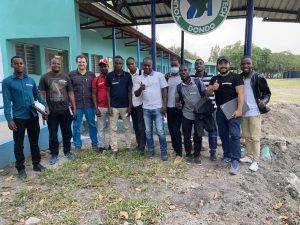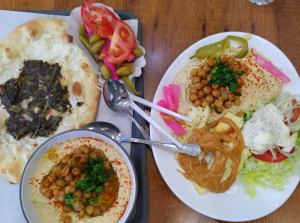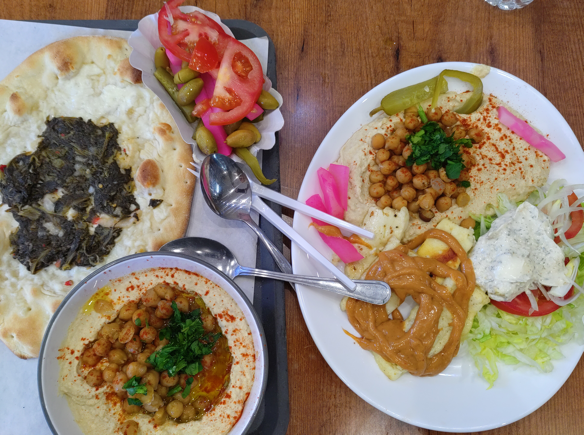9:30 a.m. – 3:30 p.m.
Packaging room, Alte Münze
The SEWOH initiative (Special Initiative One World – No Hunger) promotes agricultural value chains in Sub-Saharan Africa, Tunisia, India, and Vietnam with the aim of increasing income and employment and thus contributing to poverty reduction and food security. It is important that future value chain promotion also contributes to the transformation towards sustainable food systems. What are current challenges for the sustainability of food value chains in SEWOH partner countries? What principles can guide food value chain promotion and corresponding funding decisions? What are best practice examples and what are their limitations?

9:30 a.m. – 3:30 p.m.
Counting hall, Alte Münze
International exchange of experience: Farmers are substantially affected by the climate crisis. A high degree of adaptation, innovation and learning is demanded of them. However, practical training offers are often out of context and top down oriented. The target groups remain fall by the wayside. In the workshop we want to break up antiquated didactic consulting processes and deal with co-learning examples with the help of live-online experience reports and changes of perspective.
9:30 a.m.- 3:30 p.m.
Embossing hall, Alte Münze
Global DC future vision – and: what is in it for me: Especially the so-called developed countries have driven
the world to the edge of the abyss: Climate, biodiversity and resource crises continue to escalate despite
countless warnings and are irreversible! Catch-up development concepts with “more of the same” are therefore
no longer convincing. So which understanding of development makes sense and which development
policies outside colonial continuities are justifiable? How can we achieve cooperation that is as free of paternalism
as possible – and can we reinvent the professional field of development cooperation accordingly?
 9:30 a.m. – 3:30 p.m.
9:30 a.m. – 3:30 p.m.
Atrium, Alte Münze
Healthy, nutritious, organic, ethical, socially inclusive, fresh, tasty, safe, affordable, low-loss, available, regional, seasonal, familiar, convenient and favorably with a low carbon footprint and increasingly more often vegan: the list of factors that guide our food choices in the global North is long.
Complex decisions to eat a “good” meal lead to value-based conflicts and trade-offs for individuals, families, and social groups. In this workshop participants will discover the complexity of the various food choice and resulting conflicts collectively by taking part in culinary co-research experiments. Together we will reflect on the different multifaceted aspects, such as the missing global producer-consumer linkages causing food alienation. The workshop concludes on co-research practices to foster transformative global food systems.
Objectives:
Participants experience collectively, which factors guide food choices, critically reflect the many challenges and questions of producer groups and feedback their experiences back to those producers. The relevance of co-creation of knowledge and other enabling factors to transform global food systems are assessed.
Workshop Layout: Introduction and critical analysis of the Co-Research method:
Our partners:
10:00 a.m. – 12:00 p.m.
Knurling Hall, Alte Münze
Poverty, inequalities, famines, violent conflicts, refugees, economic crises, climate change, pandemics…to name a few. Every generation is confronted with recurring, new, and persistent global challenges and tries to find sustainable solutions for them. These challenges and solutions have now been addressed by sixty years of SLE postgraduate students. How have the challenges of international cooperation changed over the decades, what “innovative” solutions or attitudes have been in vogue, and above all, what role does the SLE play in all this? Five/six people from different decades share their experiences and perspectives, learn from each other, and look together at the future of DC, and of course that of the SLE — a generational dialogue.
1:30 p.m. – 3:30 p.m.
Knurling Hall, Alte Münze
Policy debate: This debacle calls for rethinking, among other things, the legitimacy and limits of international
interventions. This also applies to interventions under the auspices of development cooperation. Political
interventions often go wrong due to a lack of local competence; they usually fail to recognize historical and
social contexts. How can these intervention dilemmas be solved without our normative policy models failing
in the face of different historical realities?
What does a typical day in the life of a child in Germany look like, and what about that of a child in Bali, Indonesia? What is the same and what is different? We will watch a small film and see pictures about family life for the family Suci. Then we will craft head jewelry, masks, and figurines and do some role-play. At the end, there will be cookies.
Healthy, nutritious, organic, ethical, socially inclusive, fresh, tasty, safe, affordable, low-loss, available, regional, seasonal, familiar, convenient and favorably with a low carbon footprint and increasingly often vegan: the list of factors that guide our food choices in the global North is long.
Complex decisions to eat a “good” meal lead to value-based conflicts and trade-offs for individuals, families, and social groups. In this workshop, participants will collectively discover the complexity of various food choice and resulting conflicts by taking part in culinary co-research experiments. Together, we will reflect on multifaceted aspects, such as the missing global producer-consumer linkages causing food alienation. The workshop concludes with co-research practices to foster transformative global food systems.
Workshop Layout: Introduction and critical analysis of the Co-Research method:

Objectives:
Participants experience collectively which factors guide food choices and critically reflect upon the many challenges and questions of producer groups, then provide feedback on their experiences back to those producers. The relevance of co-creation of knowledge and other enabling factors to transform global food systems are assessed.
Partners: